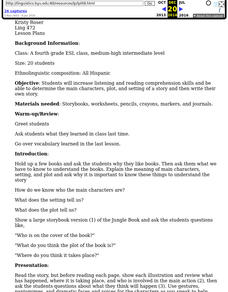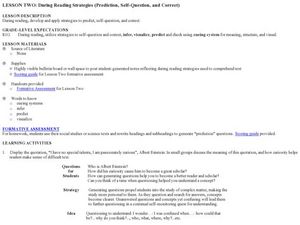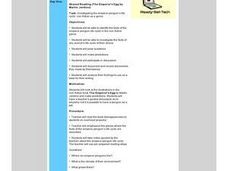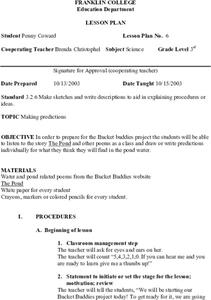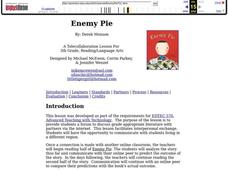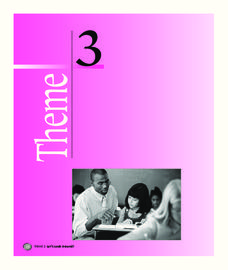Curated OER
What Do You See at the Pond?
With What Do You See at the Pond?, young readers explore pond life and practice reading strategies. Learners first make predictions and then read the simple story independently. After a second read-through with a partner, kids come...
Curated OER
Summer of the Monkeys
While reading the book Summer of the Monkeys by Wilson Rawls, the class ties together the core reading objectives, which are making predictions, comprehending new information, reading for author's purpose, independence in reading,...
Curated OER
Mo Willems Author Study
Who is Mo Willems? Explore the author with your class. Learners read books written by Willems, compare and contrast the characters therein, and make predictions about what will happen. Finish off this author study by having small groups...
Curated OER
Language Practice
The simple instructional techniques described in this plan will help young readers learn and practice basic reading skills and strategies. Before reading, introduce your readers to the meaning of main character, setting, and plot. Then...
Curated OER
Making and Monitoring Predictions-Pet Advice and Jamaica Bay
Students practice making predictions. In this comprehension lesson, students use videos to practice making predictions about the content. Students complete a handout with details about why they made certain predictions during...
Curated OER
Supporting Predictions With Text Evidence
Learners practice making and supporting a prediction with proof from a story. In this reading comprehension lesson, students read the book No Roses for Harry and make a prediction about the next event. Learners use evidence from the text...
Curated OER
The Five Senses - Observation, Experimentation, Prediction, and Categorization.
First graders engage in this creative and well-designed activity. They rotate through five learning stations, each devoted to one of the senses. They practice observation, experimentation, prediction, and categorization.
Reed Novel Studies
Three Times Lucky: Novel Study
A car crash, a murder, a hurricane. With such a plot, why is the title of Sheila Turnage's novel Three Times Lucky? After making a prediction about the plot, scholars use the novel study to research and record facts...
Curated OER
Instruments From Around the World
How much does the environment affect how and what man creates? Children explore the effect of the environment on primitive man as they research raw materials from a specific location. They use their findings to write a short essay about...
Curated OER
During Reading Strategies (Prediction, Self-Question, and Correct)
Students practice their reading skills. In this reading fluency and comprehension activity, students read instructor-selected passages and use metacognitive skills to predict, self-question, and correct.
Curated OER
Predictable Powers
Students use prior knowledge, the title, cover, and illustrations to make predictions about a story. They record their predictions on a Story Impression Worksheet, listen to the story, and check their predictions.
Curated OER
The Rest of the Story
Third graders make predictions about the story "The True Story of the Three Little Pigs" based on background knowledge. They read the story, stopping to verify or reject predictions. They write their own opinionated fairytales.
Curated OER
The Emperor's Egg by Martin Jenkins
Students explore the penguin life cycle. In this penguin life cycle lesson, students read the book The Emperor's Egg by Martin Jenkins. Students look at the pictures and make predictions. Students identify facts about penguins and do...
Curated OER
Making Predictions
Third graders develop predictions in preparation for a "Bucket Buddies" pond water project. They listen to the book "The Pond" and discuss the different life forms in the pond from the book. Students then read online poems, and draw a...
Curated OER
Prediction Using On-Line Stories!
Fifth graders analyze the elements of an online story. In this online story lesson, 5th graders analyze the title, pictures, and other information for an online story. Students predict what the text is about and complete a prediction chart.
Curated OER
Enemy Pie
Third graders pair up with a partner via an online classroom. They analyze half of the story "Enemy Pie" and communicate with their online peer to predict the outcome of the story.
Houghton Mifflin Harcourt
Let’s Look Around!: Challenge Activities (Theme 3)
Let's Look Around! is the theme of a unit that offers a plethora of challenge activities. Enhance your scholars' learning experiences and reinforce concepts with activities such as writing a book about farm animals, an...
Curated OER
Still Life Predictions
Third graders read part of the story "Balto, the Dog Who Saved Nome". They make predictions about the story ending and identify the picture clues and textual information they used to form their predictions. They discuss the story's ending.
Curated OER
Foliage Tracker
Young scholars discuss the change of leaf colors and the role that climate and elevation play in those changes. They then track leaf changes, input data, and graph foliage changes with a free online tool.
Radford University
Modeling Statistical Data
Can people predict the number of future divorces? Scholars research and analyze data on the number of divorces and teenage pregnancies in Virginia over time. They use the data to create graphs, determine the best-fit equations, and make...
K20 LEARN
The Parched Plains: Weather And Climate
How do meteorologists differentiate between droughts and dry spells? Introduce the concepts of weather forecasting and prediction with an insightful research-based lesson from the K20 series. Partners synthesize individual research from...
Curated OER
Making Predictions
Students explore predictions as they read Fahrenheit 451 by Ray Bradbury. In this reading and writing activity, students review examples of predictions. Students make predictions prior to reading each part of the book and then check for...
Curated OER
Academic Achievement
Academic goals can lead high schoolers toward bright futures. Get your class to think about where they want to be in 20 years and what they'll need to do to get there with this lesson plan. Learners fill out a brief questionnaire about...
Curated OER
Identifying Missing Words
How do you figure out the meaning of a word you don't know? Young readers develop skills to identifying missing words in a story using context clues. Picture clues are used to identify covered words in the story I Can’t Get My Turtle to...
Other popular searches
- Make Predictions Line Graph
- Using Data to Make Predictions
- Reading Make Predictions
- Learn to Make Predictions
- Learning to Make Predictions
- Make Predictions Science
- Make Predictions Story
- Infering to Make Predictions
- Make Predictions Reading
- Inferring to Make Predictions



